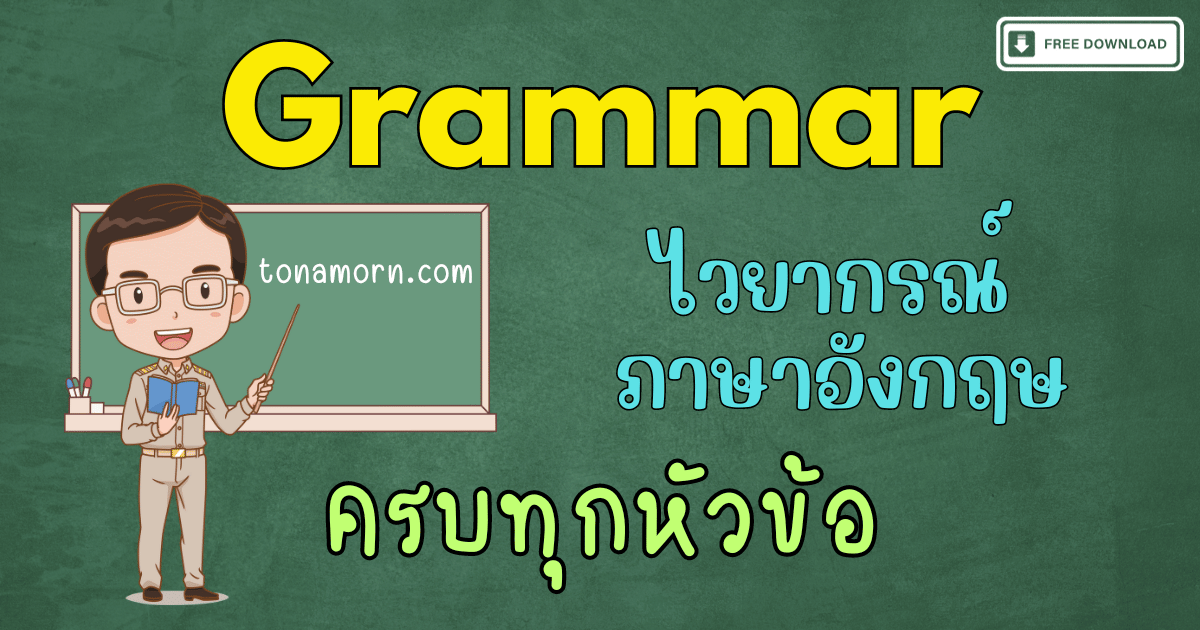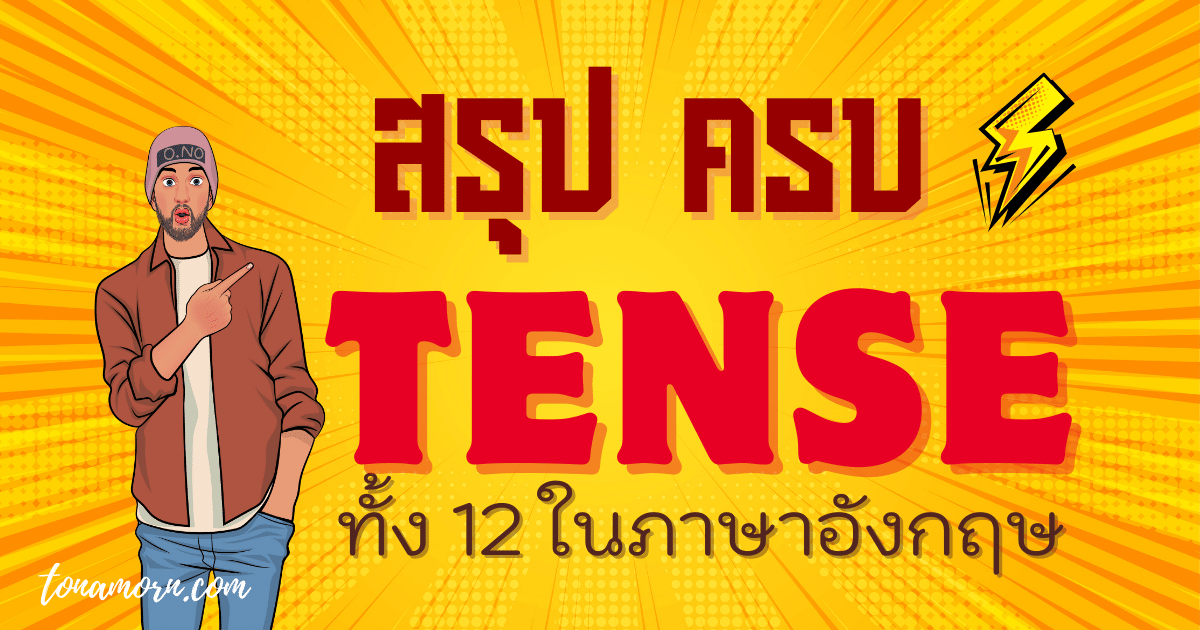Direct and Indirect speech Statements คืออะไร ตัวอย่าง พร้อมคำแปล
สรุป Direct speech and Indirect speech ประเภท Statements
A) การเปลี่ยนแปลง Tense
A.1 ในประโยค Indirect speech จะไม่มีการเปลี่ยนแปลง tense เมื่อประโยค Direct speech นั้น กล่าวถึงความจริงทั่วๆ ไป หรือที่ภาษาอังกฤษเรียกว่า General truth
ตัวอย่างประโยคภาษาอังกฤษ ตัวอย่างที่ 1
Direct speech : He said, “Light moves faster than sound.”
แปลว่า “แสงเคลื่อนที่ได้เร็วกว่าเสียง”, เขากล่าว
Indirect speech : He said that light moves faster than sound.
แปลว่า เขาพูดว่า แสงเคลื่อนที่ได้เร็วกว่าเสียง
ตัวอย่างประโยคภาษาอังกฤษ ตัวอย่างที่ 2
Direct speech : He said, “The earth rotates around the sun.”
แปลว่า “โลกหมุนรอบดวงอาทิตย์”, เขากล่าว
Indirect speech : He said that the earth rotates around the sun.
แปลว่า เขาพูดว่า โลกหมุนรอบดวงอาทิตย์
A.2 ถ้ากริยาใน Direct speech เป็น Present หรือ Future เมื่อเปลี่ยนเป็น Indirect speech จะไม่เปลี่ยน tense
ตัวอย่างประโยคภาษาอังกฤษ
Direct speech : He says, “I have finished my homework.”
แปลว่า “ฉันทำการบ้านเสร็จแล้ว”, เขากล่าว
Indirect speech : He says that he has finished his homework.
แปลว่า เขาพูดว่า เขาทำการบ้านเสร็จแล้ว
ตัวอย่างประโยคภาษาอังกฤษ เมื่อพูดถึงอนาคต
Direct speech : He will say, “You are beautiful.”
แปลว่า เขาจะพูดว่า “คุณสวย”
Indirect speech : He will say that you are beautiful.
แปลว่า เขาจะพูดว่า คุณสวย
A.3 ในประโยค Indirect speech จะไม่เปลี่ยน tense เมื่อกล่าวถึงเหตุการณ์ใน Direct speech ที่เป็นเหตุการณ์ที่ยังคงดำเนินอยู่ หรือเหตุการณ์ที่จะเกิดขึ้นในไม่ช้า
ตัวอย่างประโยคภาษาอังกฤษ
Direct speech : He said, “The bus is coming.”
แปลว่า “รถประจำทางกำลังมา” เขาได้กล่าว
Indirect speech : He said that the bus is coming.
แปลว่า เขาได้พูดว่า รถประจำทางกำลังมา
ตัวอย่างประโยคภาษาอังกฤษ ตัวอย่างที่ 2
Direct speech : He said, “My friends will be coming here in 5 minutes.”
แปลว่า “เพื่อนของฉันจะมาที่นี่ใน 5 นาที” เขาได้กล่าว
Indirect speech : He said that his friends will be coming here in 5 minutes.
แปลว่า เขาได้พูดว่า เพื่อนของเขาจะมาที่นี่ใน 5 นาที
A.4 ถ้าประโยคในเครื่องหมายคำพูดของ Direct speech เป็น Present tense แต่คำกล่าวได้กล่าวในอดีต จะเปลี่ยนเป็น Past tense เมื่อทำเป็น Indirect speech
ตัวอย่างประโยคภาษาอังกฤษ
Direct speech : He said, “I can drive a car.”
แปลว่า “ฉันสามารถขับรถยนต์ได้” เขากล่าว
Indirect speech : He said that he could drive a car.
แปลว่า เขาพูดว่า เขาสามารถขับรถยนต์ได้
ตัวอย่างประโยคภาษาอังกฤษ ตัวอย่างที่ 2
Direct speech : She said, “I have received a letter.”
แปลว่า “ฉันได้รับจดหมายแล้ว” หล่อนกล่าว
Indirect speech : She said that she had received a letter.
แปลว่า หล่อนพูดว่า หล่อนได้รับจดหมายแล้ว
A.5 ถ้าคำกล่าวนั้น กล่าวในอดีต และข้อความที่กล่าวในเครื่องหมายคำพูดเป็น Past ให้เปลี่ยนเป็น More Past คือ สมมติว่าถ้าคำกล่าวในเครื่องหมายคำพูดเป็น Past Continuous ใน Direct speech ให้เปลี่ยนเป็น Past Perfect Continuous ใน Indirect speech คือพูดง่ายๆ ว่า ถ้าเป็น Past ใดๆ ก็ตาม ให้เปลี่ยนเป็น Past Perfect นั้นๆ
ตัวอย่างประโยคภาษาอังกฤษ
Direct speech : He said, “I was playing football.”
แปลว่า “ฉันกำลังเล่นฟุตบอล (ในอดีต)” เขากล่าว
Indirect speech : He said that he had been playing football.
แปลว่า เขาได้พูดว่า เขากำลังเล่นฟุตบอล (ในอดีต)
ตัวอย่างประโยคภาษาอังกฤษ ตัวอย่างที่ 2
Direct speech : He said, “I sang a song.”
แปลว่า “ฉันร้องเพลง (ในอดีต)” เขากล่าว
Indirect speech : He said that he had sung a song.
แปลว่า เขาได้พูดว่า เขาร้องเพลง (ในอดีต)
A.6 คำกริยาช่วยต่อไปนี้ คือ would, should, ought to, had better, might, could, used to ถ้ามีในประโยค Direct speech เมื่อเราเปลี่ยนเป็น Indirect speech เราจะไม่เปลี่ยนแปลงใน Indirect speech
ตัวอย่างประโยคภาษาอังกฤษ
Direct speech : He said, “I should study hard more than this.”
Indirect speech : He said that he should study hard more than this.
A.7 ถ้าข้อความใน Direct speech เป็นประโยคเงื่อนไขที่เป็นไปไม่ได้ (Unlikely Conditions) จะไม่มีการเปลี่ยนแปลง tense ใน Indirect speech
ตัวอย่างประโยคภาษาอังกฤษ
Direct speech : Mario said, “If I were you, I wouldn’t do it.”
Indirect speech : Mario said that if he were me, he wouldn’t do it.
* การเปลี่ยน Tense
Direct speech เป็น Indirect speech
Present Simple เปลี่ยนเป็น Past Simple
Present Continuous เปลี่ยนเป็น Past Continuous
Present Perfect เปลี่ยนเป็น Past Perfect
Past Simple เปลี่ยนเป็น Past Perfect
อ่านเพิ่มเติม คลิก >> Tense
Shall เปลี่ยนเป็น should
Will เปลี่ยนเป็น would
Can เปลี่ยนเป็น could
May เปลี่ยนเป็น might
Must เปลี่ยนเป็น had to
B) การเปลี่ยนแปลงสรรพนามบุคคล (Personal Pronoun)
จากตัวอย่างต่างๆ ที่ได้เรียนไปแล้ว ผู้เรียนภาษาอังกฤษจะสามารถสังเกตได้ว่ามีการเปลี่ยนคำสรรพนามในประโยค Direct speech เป็นสรรพนามอีกตัวหนึ่ง ในประโยค Indirect speech โดยสามารถสรุปได้ดังนี้
* การเปลี่ยนแปลงสรรพนามบุคคล
Direct speech เป็น Indirect speech
I เปลี่ยนเป็น he / she (ขึ้นอยู่กับเพศของผู้พูด ใน Direct speech)
Me เปลี่ยนเป็น him / her
My เปลี่ยนเป็น his / her
Mine เปลี่ยนเป็น his / hers
Myself เปลี่ยนเป็น himself / herself
We เปลี่ยนเป็น they
Us เปลี่ยนเป็น them
Our เปลี่ยนเป็น their
Ours เปลี่ยนเป็น theirs
Ourselves เปลี่ยนเป็น themselves
You (ประธาน) เปลี่ยนเป็น I
You (กรรม) เปลี่ยนเป็น me
Your เปลี่ยนเป็น my
Yours เปลี่ยนเป็น mine
Yourself เปลี่ยนเป็น myself
Yourselves เปลี่ยนเป็น ourselves
อ่านเพิ่มเติม คลิก >> คำสรรพนามภาษาอังกฤษ
C) การเปลี่ยนแปลงคำกริยาของประโยคนำ (Reporting verb)
ตัวอย่างประโยคภาษาอังกฤษ
Direct speech : He said to me, “We are policemen.”
Indirect speech : He told me that they were policemen.
Direct speech : He says to me, “I am very hungry.”
Indirect speech : He tells me that he is very hungry.
* การเปลี่ยนแปลงคำกริยาของประโยคนำ
Direct speech เป็น Indirect speech
Say เปลี่ยนเป็น say that
Said เปลี่ยนเป็น said that
Say to … เปลี่ยนเป็น tell … that
Said to … เปลี่ยนเป็น told … that
D) การเปลี่ยนแปลงคำที่แสดงความใกล้ เป็นคำที่แสดงความไกลออกไป (Nearness to distance)
คือ การเปลี่ยนแปลงคำที่แสดงความใกล้ในประโยค Direct speech ให้แสดงความไกลยิ่งขึ้นใน Indirect speech
ตัวอย่างประโยคภาษาอังกฤษ
Direct speech : He said to Nadech, “I have been here.”
Indirect speech : He told Nadech that he had been there.
Direct speech : He said , “I went home yesterday.”
Indirect speech : He said that he had gone home the day before.
* การเปลี่ยนแปลงคำที่แสดงความใกล้ (Nearness) เป็นคำที่แสดงความไกล (Distance)
Direct speech เป็น Indirect speech
Here เปลี่ยนเป็น there
This เปลี่ยนเป็น that
These เปลี่ยนเป็น those
Now เปลี่ยนเป็น then / at once / at that time
Today เปลี่ยนเป็น that day
Yesterday เปลี่ยนเป็น the day before / the previous day
Tomorrow เปลี่ยนเป็น the next day / the following day / the day after
Ago เปลี่ยนเป็น previously / before
The day after tomorrow เปลี่ยนเป็น in two days’ time
Next week เปลี่ยนเป็น the following week / the week after
Next year เปลี่ยนเป็น the following year / the year after
Last week เปลี่ยนเป็น the previous week
Last year เปลี่ยนเป็น the previous year
Tonight เปลี่ยนเป็น the night before
Come เปลี่ยนเป็น go
Recently เปลี่ยนเป็น shortly / before then




